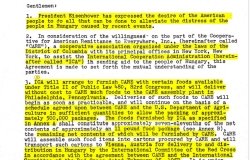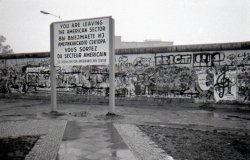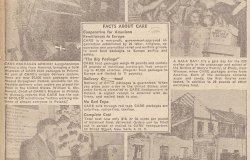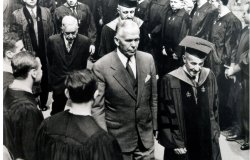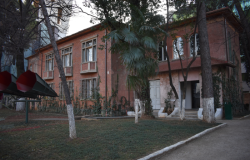Helsinki 1975 and the Transformation of Europe
Helsinki 1975 and the Transformation of Europe, featuring Oliver Bange, senior researcher and lecturer at the University of Mannheim, Germany
Overview
On September 23, Dr. Oliver Bange, senior researcher and lecturer at the University of Mannheim in Germany, discussed the findings of his recently released volume on the CSCE process entitled Helsinki 1975 and the Transformation of Europe (2008). Following the presentation, Ambassador Arthur A. Hartman, who served as Assistant Secretary of State for European and Canadian Affairs during the Nixon and Ford Administrations, and as ambassador to France and the Soviet Union, commented on the process that led up to the signing of the Helsinki Final Act.
Helsinki 1975 and the Transformation of Europe presents the unique case of the CSCE negotiations in this edited volume. The book poses a number of pivotal questions: How could the offensive Western concept of inducing change in Central and Eastern Europe coexist with and eventually even outlive the defensive, status-quo focused approaches in Nixon's White House and Brezhnev's Kremlin? Who were the people involved in the pursuit of this transformation strategy, what were their networks and how did they out-maneuver the Cold Warriors within their own administrations? What was the interrelationship between the apparently "soft" contents of the CSCE negotiations and the "hard" issues of the disarmament talks on nukes and troop cuts conducted at the same time? Which role did economics play? And last but not least: Did the communist leaderships of the Warsaw Pact realize the long-term explosiveness in this "soft" Western strategy and how did they react?
The articles in the volume – five each on the major Western and Eastern powers with an additional article on "economic détente" - offer an insight into the way through which East-West communication, mutual perceptions by the major conflicting powers, and multi-lateral as well as bi-lateral relations interacted. The negotiations, which prepared the ground for the signing of the Final Act, revolved around four baskets of issues: legitimizing post-World War II state borders; cultural and scientific exchange, including provisions for preserving the environment; a set of human rights to be observed by all parties involved; and establishing a schedule of follow up meetings for monitoring the implementation of the accords. The latter carried further implications. While the recognition that post-war borders can only be changed peacefully gave a tacit approval of the Soviet sphere of influence in Eastern Europe and acknowledged the USSR as an equal partner to the West, cooperation in the humanitarian and other fields offered the potential for opening up the closed societies in the Communist bloc. It offered dissidents a platform to demand freedom of expression and respect for human rights.
On the basis of the archival evidence presented in the volume, Oliver Bange concluded that three misperceptions were central to Eastern Europe's communist leaders' approval of the CSCE process: The first of these - as Leonid Brezhnev and Henry Kissinger did not stop assuring each other – was that the Helsinki Final Act was only a box of words to calm each other's European allies, and that real power laid with nuclear warheads, tanks and troops – and that therefore the real negotiations took place elsewhere between Washington and Moscow. Secondly, as East German leader Erich Honecker agreed with Brezhnev shortly before the signing of the Helsinki Accords, one what might be called the power of the factual. The West's implicit recognition of borders and rulers would help to socialize new generations within their communist state and system, simply because this recognition seemed to rule out other national or societal options. And thirdly, as Honecker put it half-jokingly, "there will always be the Stasi". In other words, communist leaders remained convinced – despite sincere warnings from their experts – that they could deal effectively with dissident and reform movements.
As a consequence of the meticulous archival research of the book, often tacking on hitherto unavailable documentary material, its CSCE historiography points to 1989/90 not so much as a short or medium term combination of Reaganite armament policies and dissident heroes, but explains the events as a result of a rather longish, drawn-out process. A process that created doubts and the will for reform in the mind of many people in Central and Eastern Europe – and at least some communist leaders, far and foremost Mikhail Gorbachev. A continuing and irreversible process which began in the late 1960s and which ushered – not least through the Helsinki Final Act - a new era, which saw the disintegration of the Soviet system and the protracted transition to democracy of former communist states.
In his comments Ambassador Hartman reexamined the effects of Helsinki 1975 from a policy-maker's perspective. Hartman stated that at the time a belief in initiating peaceful change based on observing Basket III agreements prevailed. The negotiations intended to bring the Soviet Union to the table on issues concerning pluralism and openness, and in this manner undermine the idea that security forces could control all spheres of life. Despite this notion, Washington welcomed Helsinki with a considerable dose of skepticism and mistrust. Did President Ford give away the store by allowing the Soviet Union to claim its current borders, as some conservatives argued at the time? What assurances were given to the Soviet leadership with regard to a possible reunification of Germany, and later of united Germany's joining NATO? Ambassador Hartman pointed out that the answers to these questions reveal the signs of a possible bargain the George H. W. Bush administration struck with the Soviet leadership in 1989-90, aimed at minimizing what could be termed the "détente effect" – transformative change in the Soviet Union – while diminishing Soviet control in Eastern Europe. The Helsinki process, he suggested, had acted as a catalyst in this process.
The collapse of the Soviet Union and of the communist regimes in Eastern Europe brought forth the challenges of national identity and state borders, Hartman concluded. The problems of the region, still evident today, will continue to confront decision-makers for years to come. Yet the ensuing Helsinki-process between 1975 and 1989 provided an example for a successful multilateral approach on how current conflicts between Russia and the European Union, Russia and the United States, conflicts like in Georgia or in Kosovo could be resolved peacefully.
Hartman's remarks were taken up by Oliver Bange who considered the CSCE-process a successful case for a "sustainable diplomacy" precisely because it offered important benefits to all official sides involved and because it worked on both the state as well as the societal levels. With this the panelists immediately triggered off a discussion amongst the audience on how Europe's experiences with multilateral détente and CSCE trigger a new transformational change in areas still facing serious security challenges.
Christian Ostermann, Director, History and Public Policy Program
Drafted by Mircea Munteanu
Hosted By

Cold War International History Project
The Cold War International History Project supports the full and prompt release of historical materials by governments on all sides of the Cold War. Through an award winning Digital Archive, the Project allows scholars, journalists, students, and the interested public to reassess the Cold War and its many contemporary legacies. It is part of the Wilson Center's History and Public Policy Program. Read more

History and Public Policy Program
The History and Public Policy Program makes public the primary source record of 20th and 21st century international history from repositories around the world, facilitates scholarship based on those records, and uses these materials to provide context for classroom, public, and policy debates on global affairs. Read more
Thank you for your interest in this event. Please send any feedback or questions to our Events staff.
